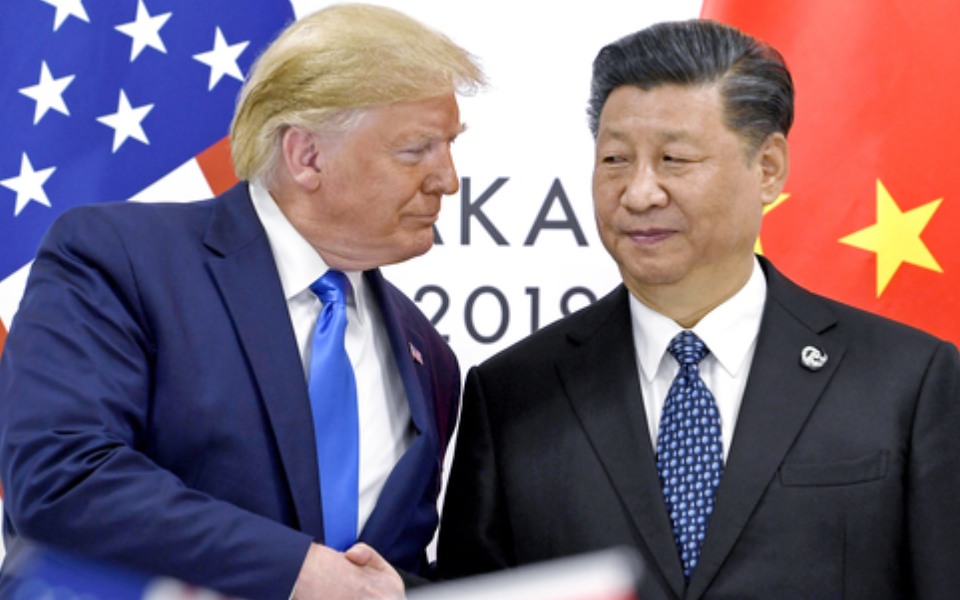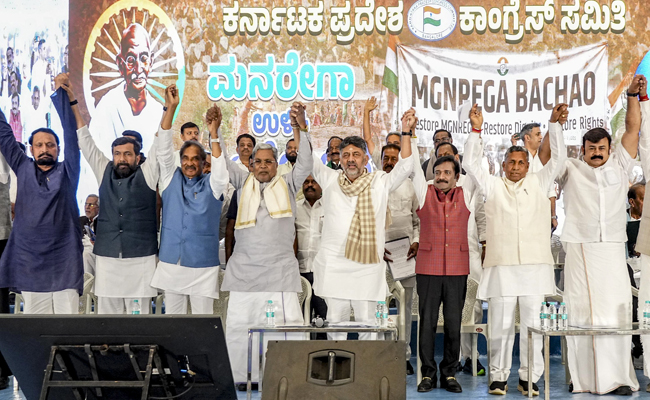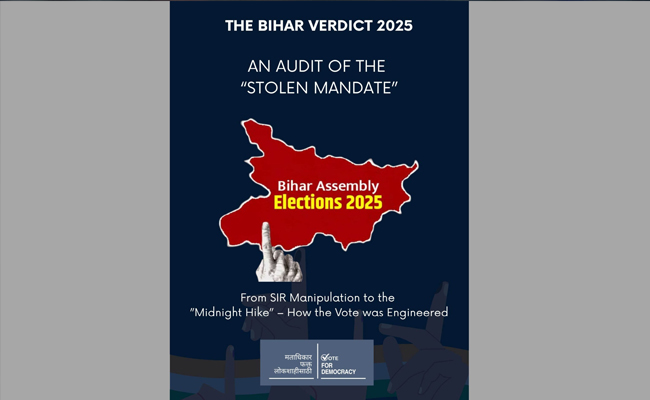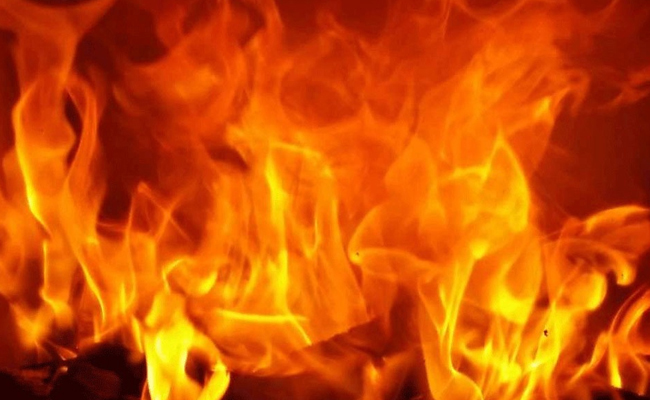Washington, Apr 16 (PTI): China now faces tariffs up to 245 per cent on imports to the United States due to its retaliatory actions, the White House has said, as the trade war escalated between the world's two largest economies.
Separately in a post on Truth Social, President Donald Trump said on Tuesday that China "just reneged on the big Boeing deal, saying that they will “not take possession” of fully committed to aircraft".
He appeared to be confirming reports that China has asked its airlines not to take deliveries of planes from American aircraft manufacturer Boeing.
In the post, he also vowed to protect the US and its farmers in a trade war with its adversaries, such as China.
In a fact sheet issued on Tuesday, the White House said President Trump signed an executive order launching an investigation into the national security risks posed by US reliance on imported processed critical minerals and their derivative products.
"On Day One, President Trump initiated his America First Trade Policy to make America’s economy great again," it said.
"More than 75 countries have already reached out to discuss new trade deals. As a result, the individualized higher tariffs are currently paused amid these discussions, except for China, which retaliated," it said.
"China now faces up to a 245% tariff on imports to the United States as a result of its retaliatory actions," the fact sheet said, without giving details.
China is the only country to have retaliated with tit-for-tat levies.
China on Friday raised its additional tariffs on imports from the US to 125 per cent in retaliation to the Trump administration's 145 per cent levies on Chinese exports. China also filed a lawsuit with the WTO following the US tariff hikes.
China earlier retaliated with 84 per cent levies and imposed restrictions on imports of some US films, expressing its interest in holding dialogue with Washington to resolve the issue.
The fact sheet accused China of banning exports to the US of gallium, germanium, antimony, and other key high-tech materials with potential military applications.
"Just this week, China suspended exports of six heavy rare earth metals, as well as rare earth magnets, in order to choke off supplies of components central to automakers, aerospace manufacturers, semiconductor companies and military contractors around the world," it added.
According to the fact sheet, processed critical minerals and their derivative products are key building blocks of Amercia's defence industrial base and integral to applications such as jet engines, missile guidance systems, advanced computing, radar systems, advanced optics, and secure communications equipment.
"The United States remains heavily dependent on foreign sources, particularly adversarial nations, for these essential materials, exposing the economy and defence sector to supply chain disruptions and economic coercion," it added.
Trump has paused the additional duties on other nations for 90 days.
On Wednesday, China appointed Li Chenggang, who has decades of experience handling international negotiations and also served as China's ambassador to the World Trade Organization, as international trade representative at the Ministry of Commerce.
The move came after President Trump said the ball was in Beijing’s court to work out a deal to end the tariff deadlock.
Let the Truth be known. If you read VB and like VB, please be a VB Supporter and Help us deliver the Truth to one and all.
Bengaluru (PTI): Karnataka Chief Minister Siddaramaiah on Tuesday launched a sharp attack on the BJP-led Centre, alleging that the MGNREGA was repealed out of "allergy" to Mahatma Gandhi’s name.
He also called for sustained, people-led agitation until the law is restored and the new VB-G Ram G Act is withdrawn.
The CM alleged that the BJP "killed" Mahatma Gandhi as the RAM in the Viksit Bharat – Guarantee Rozgar and Ajivika Mission (Gramin) (VB-G RAM G) represents Nathuram Godse, the "killer" of Gandhi, and not Lord Rama.
Addressing a preparatory meeting of the Mahatma Gandhi Employment Guarantee Scheme Bachao Sangram, organised by the Congress state unit here, Siddaramaiah said the struggle must continue "until MGNREGA is reinstated and the VB-G Ram G Act is repealed," urging party workers to turn it into a mass movement from the village to the state level.
The chief minister said, "The Centre has scrapped the Mahatma Gandhi National Rural Employment Guarantee Act and brought in a new law called VB-G RAM G. Mahatma Gandhi’s name itself causes them an allergy."
He said the issue was discussed seriously at the recent All India Congress Committee (AICC) executive committee meeting, which viewed the scrapping of MGNREGA as a grave matter.
Drawing parallels with farmers’ protests in north India, Siddaramaiah said a similar sustained movement was needed to force changes in laws. He recalled that MGNREGA was enacted during Manmohan Singh’s tenure to make the right to work a basic right for the rural poor.
"Along with employment guarantee, landmark laws like the Right to Food, Right to Information, Right to Education and Forest Rights Act were introduced to address unemployment, hunger and the problems of forest dwellers," he said.
The CM noted that the scheme, which had been in force for nearly 20 years, had provided employment to 12.16 crore workers across the country, including 6.21 crore women.
Criticising the replacement of law, Siddaramaiah alleged that the Modi government had diluted workers’ rights.
"Earlier, rural workers could demand work for up to 365 days in their own villages and even approach courts if work was denied. Now, the Centre decides through notifications where people should work," he said.
Taking a swipe, he remarked, "This is not Dasharatha Ram or Sita Ram or Kaushalya Ram. This is Nathuram — the one who killed Mahatma Gandhi. Through VB-G RAM G, Gandhi is being killed once again."
Siddaramaiah also objected to the increased financial burden on states, stating that states now have to bear 40 per cent of the cost, forcing Karnataka alone to spend around Rs 2,500 crore.
"That is why we have launched the MGNREGA Bachao Andolan. It must transform into a people’s movement," he said.
Addressing the gathering, Deputy Chief Minister D K Shivakumar alleged that the Centre will decide the works and not the villages.
According to him, no state government will accept it. Even the BJP ruled states will not implement the scheme.
"Due to the VB-G RAM G, Panchayats will not be allowed to carry out works. After losing works worth Rs one crore to Rs two crore, what is left with the Panchayats," Shivakumar, who is also Congress state president, asked.
He asked his party cadres to hold meetings in every corner of the state to spread awareness about repealing the MGNREGA.
In his address, Rural Development and Panchayat Raj Minister Priyank Kharge said, the BJP hates Mahatma Gandhi so much that they abolished the law and snatched the livelihood of poor people in the rural areas.
He also preferred calling the new scheme as "VB-Gram G" and not VB-G RAM G as the BJP has called it.
"For us, the livelihood of people is important, not the name of the scheme, but the BJP wants to trap us between the names of Gandhi Ji and Ram. We should not go for that fight. You name whatever you want, but give our villagers employment. If needed, we will change the name of the scheme once our government comes to power," Kharge, son of Congress president Mallikarjun Kharge, said.
According to him, the "VB-Gram G" has been introduced to align it with PM Gati Shakti national master plan.





